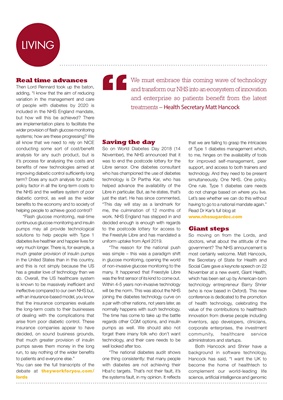
LIVINGLIVING
Real time advances
Then Lord Rennard took up the baton,
adding, "I know that the aim of reducing
variation in the management and care
of people with diabetes by 2020 is
included in the NHS England mandate,
but how this will be achieved? There
are implementation plans to facilitate the
wider provision of flash glucose monitoring
systems; how are these progressing? We
all know that we need to rely on NICE
conducting some sort of cost/benefit
analysis for any such product, but is its
processes for analysing the costs and
benefits of new technologies aimed at
improving diabetic control sufficiently long
term? Does any such analysis for public
policy factor in all the long-term costs to
the NHS and the welfare system of poor
diabetic control, as well as the wider
benefits to the economy and to society of
helping people to achieve good control?
"Flash glucose monitoring, real-time
continuous glucose monitoring and insulin
pumps may all provide technological
solutions to help people with Type 1
diabetes live healthier and happier lives for
very much longer. There is, for example, a
much greater provision of insulin pumps
in the United States than in this country,
and this is not simply because the US
has a greater love of technology than we
do. Overall, the US healthcare system
is known to be massively inefficient and
ineffective compared to our own NHS but,
with an insurance-based model, you know
that the insurance companies evaluate
the long-term costs to their businesses
of dealing with the complications that
arise from poor diabetic control. These
insurance companies appear to have
decided, on sound business grounds,
that much greater provision of insulin
pumps saves them money in the long
run, to say nothing of the wider benefits
to patients and everyone else."
You can see the full transcripts of the
debate at
www.theyworkforyou.com/lords
Saving the day
So on World Diabetes Day 2018 (14
November), the NHS announced that it
was to end the postcode lottery for the
Libre sensor. One diabetes consultant
who has championed the use of
diabetes technology, helping advance the
availability of the Libre in particular - but
as he states, that's just the start. He has
since commented, "This day which will
stay as a landmark for me, the culmination
of 12 months of work. NHS England has
stepped in and decided enough was
enough regards the postcode lottery in
relation to access to the Freestyle Libre
and has mandated a uniform uptake from
April 2019.
"The reason for the national push
was simple - this was a paradigm shift
in glucose monitoring, opening the world
of non-invasive glucose monitoring to
the many, and it so happened Freestyle
Libre was the first to come out. Within
4-5 years non-invasive technology will
be the norm. This was about the NHS
joining the diabetes technology curve on
a par with other nations, years later, as
normally happens with any technology.
The time has come to take up the battle
regards other CGM options, and insulin
pumps as well. We should also not forget
there is a vast amount of folks who don't
want technology either and that their care
needs to be well looked after too.
"The national diabetes audit shows
one thing consistently: that many people
with diabetes are not achieving their
Hba1c targets. That's not their fault, it's
the systems fault, in my opinion. It reflects
that we are failing to grasp the intricacies
of Type 1 diabetes management which,
to me, hinges on the availability of tools
for improved self-management, peer
support, and access to both trainers and
technology. And they need to be present
simultaneously. One NHS. One policy.
One rule. Type 1 diabetes care needs
do not change based on where you live.
Let's see whether we can do this without
having to go to a national mandate again."
Read Kar's full blog at
www.nhssugardoc.com
Giant steps
So moving on from the Lords, and
doctors, what about the attitude of the
government? The NHS announcement is
most certainly welcome. Matt Hancock,
the Secretary of State for Health and
Social Care gave a keynote speech on 22
November at a new event, Giant Health,
which has been set up by American-born
technology entrepreneur Barry Shrier
(who is now based in Oxford). This new
conference is dedicated to the promotion
of health technology, celebrating the
value of the contributions to healthtech
innovation from diverse people including
inventors, app developers, clinicians,
corporate enterprises, the investment
community, healthcare service
administrators and startups.
Both Hancock and Shrier have a
background in software technology,
Hancock has said, "I want the UK to
become the home of healthtech to
complement our world-leading life
science, artificial intelligence and genomic
We must embrace this coming wave of technology and
transform our NHS into an ecosystem of innovation
and enterprise so patients benefit from the latest
treatments - Health Secretary Matt Hancock"